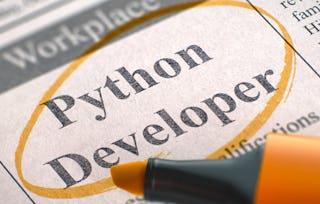Dieser Kurs bietet eine Einführung in die Programmierung und die Sprache Python. Die Kursteilnehmer werden in grundlegende Programmierkonzepte wie Datenstrukturen, Konditionale, Schleifen, Variablen und Funktionen eingeführt. Der Kurs bietet einen Überblick über die verschiedenen Tools, die zum Schreiben und Ausführen von Python zur Verfügung stehen, und bringt die Teilnehmer schnell zum Programmieren. Außerdem bietet er praktische Übungen zur Programmierung mit häufig verwendeten Datenstrukturen, zum Schreiben eigener Funktionen und zum Lesen und Schreiben von Dateien. Dieser Kurs ist möglicherweise robuster als andere Einführungskurse in Python, da er bestimmte wesentliche Programmierthemen vertieft.

Einführung in die Python-Programmierung

Einführung in die Python-Programmierung
Dieser Kurs ist Teil von Spezialisierung für Einführung in die Programmierung mit Python und Java

Dozent: Brandon Krakowsky
114.962 bereits angemeldet
Bei enthalten
1,245 reviews
Empfohlene Erfahrung
Was Sie lernen werden
Kernaspekte der Programmierung und Funktionen der Sprache Python zu erkennen
Kernkonzepte der Programmierung wie Datenstrukturen, Bedingungen, Schleifen, Variablen und Funktionen verstehen und anwenden können
Verschiedene Tools zum Schreiben und Ausführen von Python-Code verwenden
Entwerfen und schreiben Sie voll funktionsfähige Python-Programme, die häufig verwendete Datenstrukturen, benutzerdefinierte Funktionen und das Lesen und Schreiben von Dateien verwenden
Kompetenzen, die Sie erwerben
- Kategorie: Datenstrukturen
- Kategorie: Entwicklungsumgebung
- Kategorie: Python-Programmierung
- Kategorie: Jupyter
- Kategorie: Grundsätze der Programmierung
- Kategorie: Integrierte Entwicklungsumgebungen
- Kategorie: Datei-E/A
- Kategorie: Computergestütztes Denken
- Kategorie: Computer-Programmierwerkzeuge
- Kategorie: Computerprogrammierung
Wichtige Details

Zu Ihrem LinkedIn-Profil hinzufügen
12 Aufgaben
Erfahren Sie, wie Mitarbeiter führender Unternehmen gefragte Kompetenzen erwerben.

Erweitern Sie Ihre Fachkenntnisse
- Lernen Sie neue Konzepte von Branchenexperten
- Gewinnen Sie ein Grundverständnis bestimmter Themen oder Tools
- Erwerben Sie berufsrelevante Kompetenzen durch praktische Projekte
- Erwerben Sie ein Berufszertifikat zur Vorlage

In diesem Kurs gibt es 4 Module
Dieses erste Modul umfasst eine Einführung in die Programmierung und die Sprache Python. Wir beginnen mit dem Herunterladen und Installieren der notwendigen Tools, um mit der Programmierung und dem Schreiben von Code in Python zu beginnen. Nachdem wir gelernt haben, wie man auf der Konsole druckt, lernen wir die grundlegenden Datentypen von Python kennen und wie man einfache mathematische Berechnungen durchführt. Anschließend erstellen wir unser erstes Python-Skript und lernen, wie wir Variablen definieren und zuweisen und den Ablauf unseres Programms mit Hilfe von Bedingungen steuern. Wir werden auch lernen, wie wir Eingaben vom Benutzer erhalten, einschließlich einiger grundlegender Fehlerprüfungen. Legen Sie los!
Das ist alles enthalten
42 Videos11 Lektüren3 Aufgaben2 Programmieraufgaben
Wir beginnen dieses Modul mit einer kurzen Einführung in Listen, eine der am häufigsten verwendeten Datenstrukturen in Python. Wir werden gerade genug lernen, um mit Schleifen zu beginnen, die dazu dienen, einen Prozess zu wiederholen oder einen Codeblock mehrmals auszuführen. Wir werden uns mit Funktionen beschäftigen, die Blöcke organisierten Codes sind, mit denen eine einzelne, zusammenhängende Aktion ausgeführt wird. Wir werden uns einige der in Python eingebauten Funktionen ansehen und lernen, wie wir unsere eigenen benutzerdefinierten Funktionen entwerfen können, um sie als Bausteine in unseren eigenen Programmen zu verwenden. Ganz nebenbei lernen wir die besten Methoden kennen, um unseren Code für 2 verschiedene Zielgruppen zu dokumentieren: Die Benutzer, die unseren Code verwenden und ihn auf hohem Niveau verstehen wollen, und die Programmierer, die ihn lesen und wissen wollen, wie er funktioniert.
Das ist alles enthalten
31 Videos2 Lektüren3 Aufgaben1 Programmieraufgabe
In diesem Modul beginnen wir mit der Verwendung von PyCharm, einer weiteren IDE zum Schreiben und Ausführen von Python-Code. Sie verfügt über erweiterte Funktionen, die weit über die begrenzte Funktionalität von IDLE hinausgehen, und ist außerdem ein Industriestandard. Nachdem wir uns mit Listen beschäftigt haben, einschließlich der fortgeschrittenen Verwendung der häufig verwendeten Sequenz, werden wir uns mit zwei anderen sehr wichtigen Datenstrukturen beschäftigen: Sets und Tupel. Wir werden lernen, wie sie zum Speichern und Verarbeiten von Informationen genutzt werden können. Und obwohl wir bereits einige Erfahrung mit Strings haben, werden wir in diesem Modul die Feinheiten und leistungsfähigeren Funktionen von Strings erkunden.
Das ist alles enthalten
16 Videos3 Lektüren3 Aufgaben1 Programmieraufgabe
Es gibt mehrere Möglichkeiten, Daten in Python zu laden und zu speichern. Informationen können in Dictionaries gespeichert werden, einer Datenstruktur, die äußerst nützlich ist, um mehrere Attribute (oder Datenpunkte) zu einem einzelnen Objekt zu speichern. Daten können auch in externen Dateien gespeichert und dann in Python geladen werden. Dieses Modul ermöglicht es uns, auf verschiedene Weise mit Wörterbüchern zu arbeiten und mit dem lokalen Dateisystem zu interagieren, indem wir externe Dateien öffnen, aus ihnen lesen und in sie schreiben. Mit diesen zusätzlichen Kenntnissen bekommen Sie ein besseres Gefühl für die dynamische Kraft von Python und dafür, wie einfach es sich in andere Systeme integrieren lässt.
Das ist alles enthalten
17 Videos3 Lektüren3 Aufgaben1 Programmieraufgabe
Erwerben Sie ein Karrierezertifikat.
Fügen Sie dieses Zeugnis Ihrem LinkedIn-Profil, Lebenslauf oder CV hinzu. Teilen Sie sie in Social Media und in Ihrer Leistungsbeurteilung.
Dozent

Mehr von Softwareentwicklung entdecken
 Status: Vorschau
Status: VorschauUniversity of Leeds
 Status: Kostenloser Testzeitraum
Status: Kostenloser Testzeitraum Status: Kostenloser Testzeitraum
Status: Kostenloser TestzeitraumDuke University
 Status: Kostenloser Testzeitraum
Status: Kostenloser TestzeitraumRice University
Warum entscheiden sich Menschen für Coursera für ihre Karriere?

Felipe M.

Jennifer J.

Larry W.

Chaitanya A.
Bewertungen von Lernenden
- 5 stars
71,08 %
- 4 stars
19,83 %
- 3 stars
4,97 %
- 2 stars
2 %
- 1 star
2,08 %
Zeigt 3 von 1245 an
Geprüft am 9. Aug. 2022
Although the homework gets difficult, it is progressive and is manageable is we spend enough time on it.highly recommending this class to people like me with no coding expereience!
Geprüft am 19. Juli 2023
I am happy to say thanks to the tutor and coursera platform for providing this opportunity. Personally i feel about the course is that assignments are quite difficult for beginners. Thank you
Geprüft am 14. Apr. 2024
I really enjoyed this course. It was well paced and covered the basics nicely. The practice exercises were hard, but made sure you learned all the key concepts.

Neue Karrieremöglichkeiten mit Coursera Plus
Unbegrenzter Zugang zu 10,000+ Weltklasse-Kursen, praktischen Projekten und berufsqualifizierenden Zertifikatsprogrammen - alles in Ihrem Abonnement enthalten
Bringen Sie Ihre Karriere mit einem Online-Abschluss voran.
Erwerben Sie einen Abschluss von erstklassigen Universitäten – 100 % online
Schließen Sie sich mehr als 3.400 Unternehmen in aller Welt an, die sich für Coursera for Business entschieden haben.
Schulen Sie Ihre Mitarbeiter*innen, um sich in der digitalen Wirtschaft zu behaupten.
Häufig gestellte Fragen
Nein, definitiv nicht! Diese Specializations richtet sich an alle, die sich für Problemlösungen interessieren und Einführungen in Python oder Java erlernen möchten. Es sind keine Vorkenntnisse in Informatik oder Programmierung erforderlich.
Die einzige Mathematik, die Sie für diese Specializations benötigen, ist Arithmetik und grundlegende Konzepte der Logik.
Dieser Kurs ist der erste in der Einführung in die Programmierung mit Python und Java Specialization. Wenn er Ihnen gefallen hat, empfehlen wir Ihnen die Kurse 2, 3 und 4 der Reihe!
Wenn Sie über die Grundlagen der Programmierung hinaus die Grundlagen der Informatik erlernen möchten, sollten Sie in Erwägung ziehen, sich für den Master of Computer and Information and Technology (MCIT) an der University of Pennsylvania zu bewerben, ein Informatik-Masterstudiengang der Ivy League für Personen ohne Informatikhintergrund. Für eine Erfahrung auf dem Campus, erkunden Sie hier. Wenn Sie eine Online-Umgebung bevorzugen, bewerben Sie sich bei MCIT Online. Die Vorlesungen dieser Reihe werden nämlich auch im Online-Studiengang verwendet! Das Specializations-Zertifikat wird von der Zulassungskommission positiv bewertet, also erwähnen Sie es unbedingt bei Ihrer Bewerbung.
Weitere Fragen
Finanzielle Unterstützung verfügbar,

